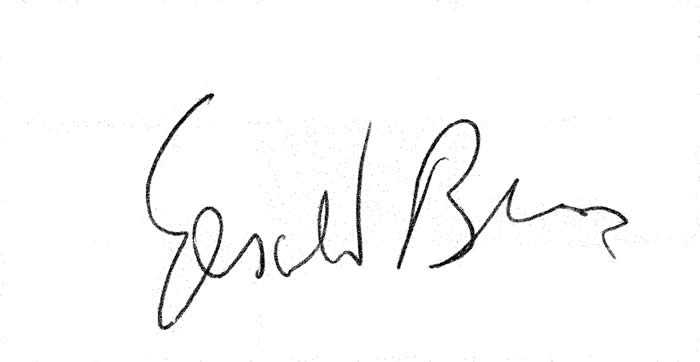
Stay, lovely rose. Found outside a florist's, not even a half-inch of stem left,
so I fill my tiny vase to the lip, magenta-ish petals going to pink, the whole on
a black pressed-rubber coaster on my woodgrain formica desk top, and filling
the vase again for the first time smelled the bloom, rich, old-rose, doomed but game.
I took it home in the pocket of my jacket. (I've done it with fallen roses before.)
The vase like a squat Ehrlenmeyer flask with eight long lozenges cut or moulded up the neck
floats on a smaller base, dark where it reflects the black mat, an unpretentious stand
for my blossom, the outer petals peeling free, fresh in the middle. I'd been to the
Perfume House, assailed by scent, looking at vetiver from Guerlain, finding Yardley
makes, for me, a heliotrope, admiring paper boxes from England and France's spidery print
more than ultraflashy moulded showpiece glass, finding lime may be at the base
of the perfume I've thought smelled mineral, as if green jade expressed . . . and so,
carrying my vase from the tap with its wee rose like a stopper, smelt it.
And not before, as if I didn't own it, thing to give house room, save a day.
Somewhere there must be an orchid, built like a sexual organ, with a scent
but I've not heard of it. Stay, nameless rose, is not sentiment, but acknowledgment.
I've been asked why I leave out pronouns sometimes, and fear it's for the sound. After all
it's there impliciter, I suppose as a thornless rose might half-remember old defenses.
Commas likewise live in the spaces they could go. Words are not privileged because they rhyme.
The alchemical ghost rose I write and write about, revenant in mist and vapor as
if a cloud chamber track, tells us more about the wish of old experimenters (and contemporary
engravers of woodcuts), one admirable British edition of Van Gogh's letters without illustration, the
line, the flask in a book unanalogous to instances in verse line, made of words.
Employ the flaw, oval from removed thorn, ungenetic sign taste interferes.
An uninflected language can omit these things at will, xylemaceous pointers with their points,
if I've got that right. Indulge me, you think I say, proffering the fliptop cane's rappee.
Beethoven, they say, always had a picture (like the rose?) in his head when he composed,
probably a historical painting, cylindrical hats with visors, lots of artillery, Guernica, no notion
he'd be marched into church when he was dead, the French horns and candles like vowels.
We compose, eat, throw tons of paper on the floor, have an inner life, the
hesitations like pauses in a symphony people applaud at (knowing when to kneel),
the social pressures on verse not limited to their author. Blame the scimitar, infidels, another
seraglio painting to whoop at, the wee birds in cages, Yeats knew, windup clockwork.
Cézanne painted paper flowers sometimes because they didn't wilt. I once did
a little panel of wilted Irises, difficult because so much like lavender or blue kleenex.
Compose for me, write a music piece and dedicate it to me, what fame is that?
Tombeaux become you, as Lipking says leaving space for the author too. Verlaine
slithers in the grass, look up, the clouds. Orange birds, paired, make pairs.
Intercalary
A jaguar with a clock-face for a head bears, in truth, a watch-face
cut from an ad, pushing something jeweled and Swiss. It "looks" at you, saying
ten forty-five or something, token time impressed on slick paper, maybe glued on
upside-down, really four-fifteen, time yesterday and tomorrow, not today. Beyond the
accident of hands at picturesque intervals is the oddity of being stared at by the replica
of a timepiece, Poême flacon. The more they say art's to reveal to everyone
the more private my references get, yet all cut out of Vogue, accessible books.
What would it be like to be that animal? a figure in a tapestry, really a cheap collage.
The body is as much a sign as the (clock) face of a kind of life, sideways from us,
only apparently looking at us. Even a sundial is oblique, or we're likely to throw its shadow.
So, that the animal's face is turned toward us has us feel we're (and it's) watched, a
speculum like a Sphinx face eroded by bullets, the disruption made by hooligan time.
Imagining wisdom as an act of attention would get you bricolage every time,
the ordinariness of its components the ordinariness of its off moments, drinking tea.
Copyright Gerald Burns 1995-1997